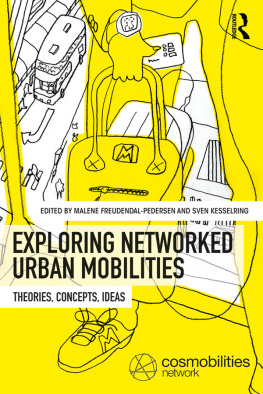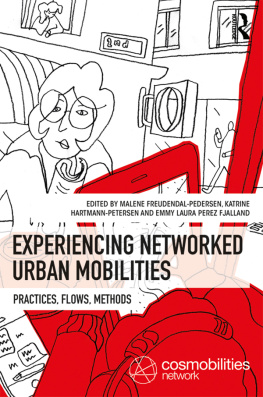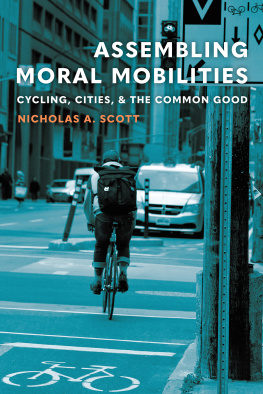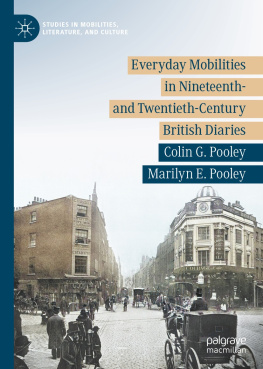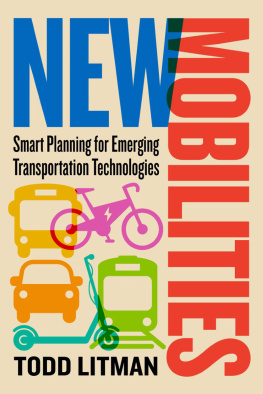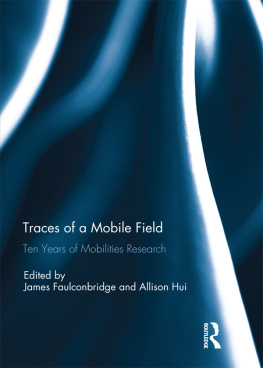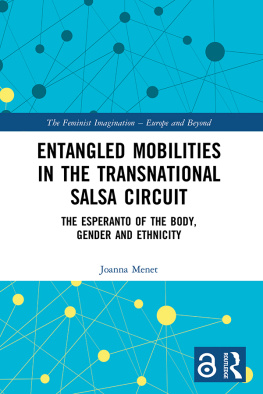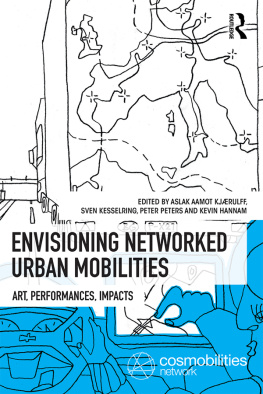First published 2018
by Routledge
711 Third Avenue, New York, NY 10017
and by Routledge
2 Park Square, Milton Park, Abingdon, Oxon, OX14 4RN
Routledge is an imprint of the Taylor & Francis Group, an informa business
2018 Taylor & Francis
The right of Malene Freudendal-Pedersen and Sven Kesselring to be identified as the authors of the editorial material, and of the authors for their individual chapters, has been asserted in accordance with sections 77 and 78 of the Copyright, Designs and Patents Act 1988.
All rights reserved. No part of this book may be reprinted or reproduced or utilised in any form or by any electronic, mechanical, or other means, now known or hereafter invented, including photocopying and recording, or in any information storage or retrieval system, without permission in writing from the publishers.
Trademark notice: Product or corporate names may be trademarks or registered trademarks, and are used only for identification and explanation without intent to infringe.
Library of Congress Cataloging-in-Publication Data
A catalog record for this book has been requested
ISBN: 978-1-138-70886-0 (hbk)
ISBN: 978-1-315-20107-8 (ebk)
Typeset in Sabon
by Apex CoVantage, LLC

Networked Urban Mobilities: This was the title for the conference and art exhibition that the Cosmobilities Network organized from the 5th to the 7th of November 2014 in Copenhagen. It was a big scientific event and the reason for it was the tenth anniversary of the international research network. The conference was jointly organized by a team from Aalborg University and Roskilde University.
About 160 participants came to Aalborg Universitys campus in Copenhagen and in this three-volume set many of them are presenting their work and ideas. The book you hold in your hand is the first volume and it compiles theoretical debates, conceptual considerations, and new ideas and perspectives which are prominent within the new mobilities paradigm. Volume two is edited by Malene Freudendal-Pedersen, Katrine Hartmann-Petersen, and Emmy Laura Perez Fjalland, and presents a wide range of contributions which have the ambition to illustrate the strength of and variety in subjects and empirical broadness within the mobilities paradigm. Its subtitle indicates this in a pithy way: Practices, Flows, Methods. Volume three is edited by Aslak Aamot Kjrulff, Sven Kesselring, Peter Peters, and Kevin Hannam. It collects contributions from the conference on Art, Performances, Impacts, as the subtitle tells. By so doing it propels a topic which has been a significant element of the work within the Cosmobilities Network since the 2008 conference on mobility and art in Munich: to demonstrate the analytical power of art and social science.
The Conference in Copenhagen was a special event and a milestone for the network in many ways.
Firstly, the Cosmobilities Network celebrated its birthday. Ten years before a small crowd of people came together in Munich for a workshop on Mobility and the Cosmopolitan Perspective. At this time no one considered this the birth of a long-lasting collaboration and research network. The name Cosmobilities was mostly a running gag on how to shorten cosmopolitan mobilities during these days. At some point John Urry laughingly said, This name calls for a network! And more than a decade later, the Cosmobilities Network plays a substantial role within the mobilities turn in social science and beyond. At the tenth anniversary conference we were celebrating Cosmobilities as an academic space, a place for encounters, and a synonym for cutting-edge research and scientific innovation. A huge number of individual scholars and research institutions worldwide have generated a new interdisciplinary literature and a new thinking on the social transformations of the modern mobile world, its risks, and opportunities. The new mobilities paradigm has influenced work and thoughts of academic scholars as well as practitioners in public authorities, industry, and civil society.
Secondly, what we luckily didnt know at this time, it was the last Cosmobilities conference where two very important academic personalities and thinkers, who both played an important role in the 2004 workshop and the beginning of the network, were still with us.
German sociologist Ulrich Beck was invited to the 2004 workshop and in the aftermath he fostered the founding process of the Cosmobilities Network. In the 2014 Conference catalogue he wrote a welcome note to the participants, stating that Cosmobilities has become a reflexive place and space for re-thinking the basic principles of modernity and for the future of modern societies.
John Urrys role since 2004 and up until a very sad day in March 2016 cannot be overestimated. In many ways he was and still is the spiritus rector and the mentor of the network and of many, many mobilities scholars. Without his unique personality and his brilliant mind the network would not be what it is today. And this is said without any exaggeration. For the 2014 conference catalogue he wrote:
Throughout the last decade Cosmobilities has provided a really brilliant space that has nurtured the emerging mobilities paradigm. As a horizontal network of many senior and junior colleagues you have done a great job in bringing together scholars from many different fields and theoretical approaches as well as research traditions. You have been bridging the gap between academia and practitioners, too. And hopefully Cosmobilities will long continue.
The book series Networked Urban Mobilities is dedicated to these two thinkers. Both of their words we consider as the assignment and the mission of the Cosmobilities Network. We hope that the book in your hand and all three volumes together will give an overview of the depth, the diversity, and analytical sharpness of the new mobilities paradigm and the potentials of the scholars of the network. Beyond this we wish you an exciting and illuminating reading experience.
We would be glad if this book aroused some interest in our work, and maybe we will see you at one of the next Cosmobilities conferences.
Malene Freudendal-Pedersen , Sven Kesselring
Copenhagen, September 2016
Ulrich Beck (19442015) was one of the most influential contemporary German sociologists. His work focused on questions of uncontrollability, ignorance, and uncertainty in the modern age, and he coined the terms risk society, second modernity, or reflexive modernization. He also tried to overturn national perspectives that predominated in sociological investigations with a cosmopolitanism that acknowledges the interconnectedness of the modern world. He was a professor at the Ludwig-Maximilians-University in Munich and also held appointments at the Fondation Maison des Sciences de lHomme (FMSH) in Paris, and at the London School of Economics.
Monika Bscher is Professor of Sociology at Lancaster University, UK, Director of the Centre for Mobilities Research, and Associate Director at the Institute for Social Futures. Her research explores the digital dimension of contemporary mobile lives with a focus on IT ethics. She leads research on the informationalization of risk governance, exploring opportunities and challenges in national and international projects (BRIDGE, SecInCoRe). She edits the book series Changing Mobilities (Routledge) with Peter Adey.
Malene Freudendal-Pedersen is Associate Professor in Sustainable Mobilities at Roskilde University, Denmark. She has an interdisciplinary background linking sociology, geography, urban planning, and science and technology studies which she has been using to investigate praxes of mobilities and their significance for (future) cities. She is the co-manager of the international Cosmobilities Network, and the co-founder and co-editor of the new journal Applied Mobilities (Taylor & Francis). She is the author of the book Mobility in Daily Life: Between Freedom and Unfreedom .

